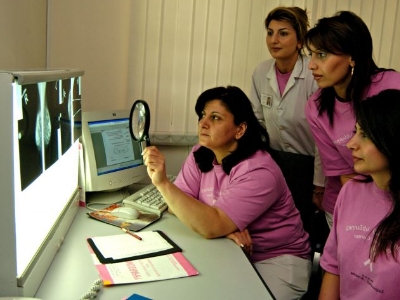Breast Cancer

Breast cancer is the most common cancer in women in the United States. Although this cancer may occur in both men and women, it’s far more common in women.
Breast cancer is cancer that starts in breast tissue. It happens when cells in the breast change and grow out of control. The cells usually form a tumor. Sometimes cancer does not spread any further. It may just spread to nearby tissues and lymph nodes. Or cancer may metastasize through the lymph system or the blood.

Symptoms of Breast Cancer
- Changes to the skin over the breast, such as dimpling
- A newly inverted nipple
- A breast lump or thickening that feels different from the surrounding tissue
- Change in the size, shape, or appearance of a breast
- Redness or pitting of the skin over your breast, like the skin of an orange
- Peeling, scaling, crusting, or flaking of the pigmented area of skin surrounding the nipple or breast skin
Causes of Breast Cancer
Doctors know that breast cancer occurs when certain breast cells grow abnormally. The cells multiply more rapidly than healthy ones do, forming lumps or masses as they accumulate. Your breast cancer cells may spread (metastasize) to your lymph nodes or other parts of your body.
Most breast cancers start in the milk-producing ducts (invasive ductal carcinoma). Invasive lobular carcinoma may also develop in the glandular tissue called lobules (breast cancer).
Several factors can increase your risk of breast cancer, including hormonal, lifestyle, and environmental factors. However, it is not known why some people with no risk factors develop cancer while others with risk factors never do. Breast cancer is likely caused by a combination of your genetic makeup and the environment you live in.
Risk Factors of Breast Cancer
Factors that are associated with an increased risk of breast cancer include:
- Increasing age
- Being female
- A personal history of breast conditions
- A family history of breast cancer
- Radiation exposure
- Obesity
- Beginning your period at a younger age
- Beginning menopause at an older age
- Having your first child at an older age
- Drinking alcohol. Drinking alcohol increases the risk of breast cancer
- Inherited genes that increase cancer risk. Certain gene mutations that increase the risk of breast cancer can be passed from parents to children.

Diagnosis of Breast Cancer
Tests and procedures used to diagnose breast cancer include:
- Breast magnetic resonance imaging (MRI)
- Removing a sample of breast cells for testing (biopsy)
- Breast ultrasound
- Mammogram
- Breast exam
Depending on your situation, other tests and procedures may be used.
Treatment and Medications for Breast Cancer
Almost all women who have breast cancer undergo surgery, and many also receive additional treatment, such as chemotherapy, hormone therapy, or radiation. Chemotherapy is sometimes used before surgery as well.
You may feel overwhelmed as you make complicated decisions about breast cancer treatment. Consider seeking a second opinion from a breast specialist in a breast center or clinic. Talk to other women who have faced the same decision.
Medications used for Breast Cancer:



